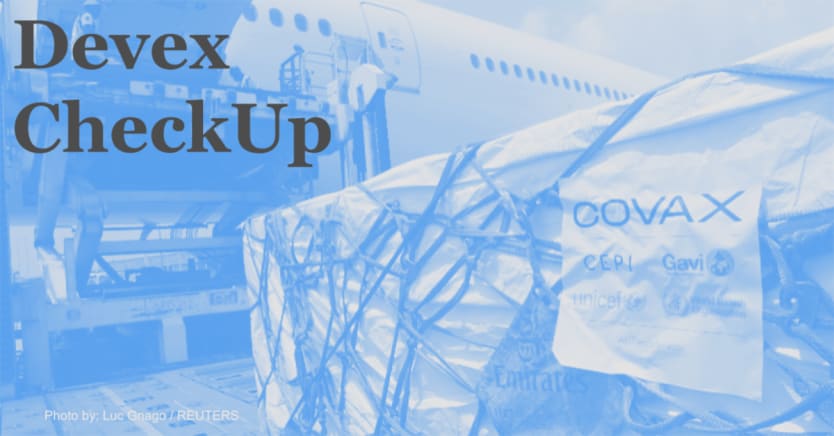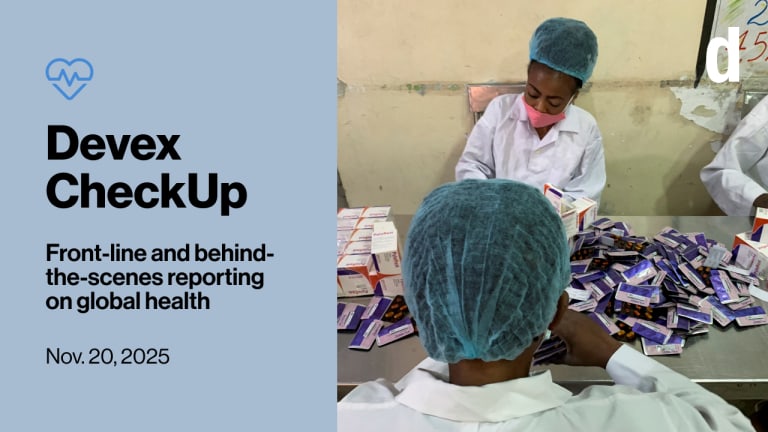
Officially, over 6 million people around the world have died of COVID-19. But that does not capture the true impact of the pandemic, as many countries simply don’t have the capacity to record deaths accurately and the global toll does not account for deaths that occurred as collateral damage due to health systems being stressed beyond their capacity.
This is a preview of Devex CheckUp
Sign up to this newsletter for exclusive global health news and insider insights, in your inbox every Thursday.
WHO has been working to remedy this since February 2021, and it’s now ready to publish estimates of excess mortality caused by the pandemic in early April, WHO tells Amruta. Her sources say these estimates place the actual death toll at more than double the 6.14 million figure, at a minimum.
• Not all countries are expected to appreciate this new information because they feel “it’s either blaming them for incompetence or for obfuscation of data,” says Ariel Karlinsky, a data scientist who co-created the World Mortality Dataset and is part of a WHO technical advisory group on assessing COVID-19 mortality.
• According to a TAG member who did not want to be named since they are not authorized to comment on the topic, India is among those countries — and it even asked WHO to postpone releasing the estimates for “10 more years.” But this is not the first time India has challenged research showing excess COVID-19 mortality. This year, studies in the journals Science and The Lancet were both dismissed as “speculative” by the government. India’s numbers in WHO’s estimate are expected to be at least quadruple the country’s official figures.
• This will not deter WHO from publishing the estimates, however. “It would be irresponsible to say, let’s wait until the pandemic is over, then we will reflect,” says a spokesperson for the agency. “If lessons can be learned now, if lives can be saved now, then we have a responsibility to learn those lessons, and save those lives now.”
• The excess mortality estimates are not only important in understanding the true impact of COVID-19, but they will spur the practice of maintaining civil registrations and vital statistics across countries, which will also help in identifying future risks.
• Dr. Prabhat Jha, the director of the Centre for Global Health Research at the University of Toronto whose study on excess deaths in India was published in Science in January, recommends including a question about deaths in forthcoming censuses, not just in India but in other countries as well.
Exclusive: The pushback against WHO's imminent COVID-19 excess deaths estimate
Money in
African nations fall far short of manufacturing the vaccines and drugs needed to meet local demand; 99% of vaccines and about 60% to 70% of drugs used on the continent are imported. The pandemic laid bare this problem when high-income nations hoarded COVID-19 vaccines and a lack of local production led to long delays in vaccinations in Africa, as countries were dependent on handouts from wealthy countries. African leaders have vowed this will not happen again, prompting initiatives to ramp up production.
Your next job?
Senior Technical Advisor, Family Planning and Reproductive Health
Pathfinder International
Egypt
The African Development Bank plans to invest $3 billion over the next decade to help scale up vaccine and pharmaceutical manufacturing in African nations, with a focus on regional hubs working to achieve economies of scale. Our colleague Sara Jerving speaks with Solomon Quaynor — the bank’s vice president for the private sector, infrastructure, and industrialization — about the nature of these investments.
Read: Behind AfDB's $3B plan for African health manufacturing (Pro)
+ Devex Pro subscribers can also learn more about how to increase the bankability of vaccine manufacturing projects in Africa. Not gone Pro yet? Try it for free for 15 days.
By the numbers
Less than 1%
—That’s the percentage of board seats held by women from low-income countries out of 2,014 total seats across 146 global health organizations, according to the latest analysis by Global Health 50/50, which has been tracking gender imbalances in global health leadership since 2018.
Sarah Hawkes, a co-director at Global Health 50/50, says the findings “demonstrate that global health is not truly global.” But instead of cosmetic changes, such as changing the sector’s name, she tells Jenny that the sector “should focus … [its] energy on transforming the way that power is held. In other words, ensuring that the sector lives up to its name.”
Read more: Women from LICs hold only 1% of health nonprofit board seats
A chronic problem
Civil society organizations say the Global Fund should demand improvements in procurement and supply chain processes in Kenya and Mozambique to ensure lifesaving medicines don’t run out of stock, after a recent audit found significant delays between the procurement and delivery of HIV, tuberculosis, and malaria commodities in both countries.
“This is a problem that has been there for a long time,” Maureen Milanga, the director of international policy and advocacy for Health Global Access Project, tells Andrew Green in a report for Devex. “The Global Fund should be held accountable because they keep funding a broken system.”
Read: Global Fund called to account for stock shortages in Kenya, Mozambique
What we’re reading
The U.S. FDA has authorized fourth COVID-19 vaccine doses from Pfizer and Moderna for people aged 50 and older. [CNBC]
Omicron subvariant BA.2 now represents 86% of all sequenced COVID-19 cases globally, according to WHO. [Al Jazeera]
U.S. President Joe Biden’s budget proposal includes $2 billion for the Global Fund, part of a $6 billion pledge to the multilateral funder over three years. [Devex]










